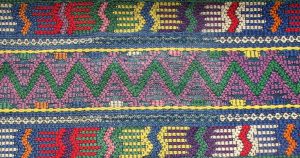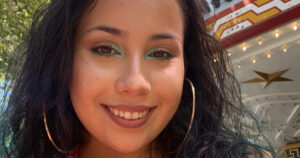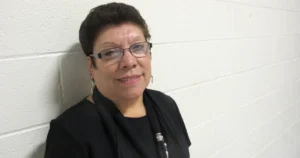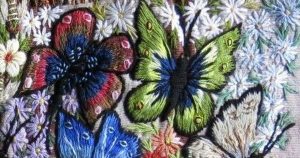![]()
My name is María Trinidad Aviña. I was born in Venustiano Carranza, Michoacán, now called San Pedro Caro. Well, I, ever since I can remember, around the time I was seven years old, I went to elementary school, and my parents put me in elementary, and that’s all I studied. After that, I went to work in a strawberry packinghouse. In Michoacán we work. Michoacán produces a lot of strawberries and there is a jam industry. I worked there for three years and then I got married at 15. At 19, I had my first son. Nineteen years old I had my first son, and a year after I had another one. After that, my husband came over here to the United States. Every year, he came to see us. And then after my two sons, I miscarried a girl and it pained me a lot, to me it was as if I were dead in real life.
It caused me great pain; there were a lot of problems in my marriage and in everything between my husband and me. I fell into a strong depression. But, thank God I joined a group from the Catholic Church, and they helped me out a lot. I overcame all that, and then my husband came back and we fought less. Then, I had another son and then there were three boys. After my last boy, seven years went by, and I became pregnant with a baby girl. And it was maximum joy. Maximum because since I had lost a girl I had dreamt of having another girl, right? And when I had her back, I felt it in my heart. I had her back and I had my girl and it was such huge happiness.
After two years, my father passed away. It was very painful to me because my father was very loving to us. He died at 68 years old. I was very used to being with my mom, with my family here at the pueblo. And so my husband, in the time that he was here, working, we had built a little house. With what he sent me I saved, and we built a little home that we have there in San Pedro Caro. Later, when he had become a resident through the amnesty in 1990, he made us residents in 2002.
We came to Ciudad Juarez, we did all the paperwork, all that process. We went to get fingerprinted. We went through that bridge that brings so much sadness to me. That bridge makes me very sad. Also, because I was very scared, because I felt as if a group of people was going to rob us, I was very scared that time, and then we crossed the bridge and all. We got fingerprinted, our visa was rejected and we came back. I came back to my home state of Michoacán, and my husband came over here to California, to continue working and find us a little apartment to live in because he lived only with men. After that, he got an apartment here, but no, he lived in King City and he couldn’t find a place in King City, but he applied everywhere, right, to apartments and everything. But it turned out he didn’t find anything, but then in Greenfield he found a house, right, and so we came to live over here, we came here to live in this house.
I suffered a lot at the beginning because I had also lost my father and I was depressed that I had left my mother too, and I changed the place, the country and I felt very depressed. I comforted myself and told myself, you must make the best out of it. I was with my husband; and for so long I had wanted so much to be with him. I must find what makes this place good, I told myself, and I must find what makes this place good.
“I must make the best of it and not think about the sadness anymore.”
So my boy who I had brought when he was in sixth, he was in 6th grade, he was going into 6th grade and he went to a school here near a catholic church, here in Greenfield.
So, then, my son was going to middle school, it’s called medio school, right? Sixth grade and it was near the Catholic Church. That, to me, was great joy because every time I took my son to school, I stopped by the church. And I felt at home there, I thought, “Oh, this is my home, my second home.” I felt very nice, I did. And I cried too, but mostly out of relief. So then, after a while I’d leave.
I get along and I enjoy myself with people no problem. It’s easy to talk to people, right?
“I started making friends and all. And then I started meeting more mothers at school, that’s how I found out that someone needed help with taking care of their children so they could go to work, and I offered.”
I told them, “I am at home with my husband and my three sons who work. I can take care of your children, if you want, I have a phone number.” I started to make my way. I was in business. Since then I have been taking care of children, and I started going to some places to better prepare myself. I wanted to get a license to take better care of the children.
I got my license, and I went to classes and did CPR. I was going to Salinas for some classes to take care of kids. I went to conferences. I also did them here in King City. And I took some units. We got paid and since then, I’ve felt like my life has changed, my life changed and we came from the house where we came to, to some apartments. The apartment was bigger. I met more people and then, when houses went down; my husband’s friends told him that instead of paying rent in a better apartment, we would be better off paying for a house. My husband was qualified, and we are paying for a house, and well, my children, like I told you, I have three grown children; one is 32, one is 30, 24, then my girl who is 15 and my youngest boy who is 9. And after him, I had another one but it was a miscarriage. And since then, no more ‘til today, no more pregnancies. Then I met this group, while I was going to my childcare classes, I met Lideres at the library and I joined, I liked it. I am learning a lot of things every day, and share with my friends what their rights are and which agencies they can refer to if they need help. I have learned many things and am very happy. Yes, that is mi historia.
Storyteller María T. Aviña is a member of Lideres Campesinas. She is from Mexico.





